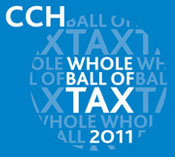| Home | About Us | Order Products | Press Center | Customer Service | Career Opportunities |

CCH can assist you with stories, including interviews with CCH subject experts.
Also, the 2011 CCH provides special CCH Tax Briefings on key topics at CCHGroup.com/Legislation.
|
CCH Clarifies New 1099 Reporting Rules, Updates Repeal AttemptsProcessing, Paperwork Projected to Soar Over Current Levels(RIVERWOODS, ILL., January 2011) – New tax regulations set to take effect in 2012 could spark an enormous jump in 1099 form processing for U.S. companies. CCH, a Wolters Kluwer business and a leading provider of tax, accounting and audit information, software and services (CCHGroup.com), examines the implications of the new requirement contained in the massive Patient Protection and Affordable Care Act, which was enacted in March 2010. $600 ThresholdUnder the law, starting in 2012, businesses will be required to issue 1099s to any vendor from whom they purchase more than $600 in goods or services, including such things as office equipment, food, bottled water, gasoline, lumber and plumbing supplies. An exemption for corporations that had been in place under the previous law will be repealed when the new law takes effect. In many cases, companies will also have to report payments for things like travel, telephone and Internet service. The IRS estimates that the federal government fails to collect an estimated $290 billion a year in tax revenue on income that is not reported. The new 1099 reporting requirement is designed to close that tax gap between what individuals and businesses owe compared to what they actually pay. Additionally, Congress expects the 1099 measure to raise $17 billion in taxes and fees, offsetting part of the cost of health care reform. “Increasing third-party reporting is proven to increase compliance, but the new law places a heavy accounting and reporting burden on businesses,” said CCH Senior Federal Tax Analyst John W. Roth, JD, LLM. “There’s been a lot of pushback from the business community, but intense lobbying to amend or repeal the 1099 reporting requirement has fallen short and it still remains set to go into effect.” Legislative Efforts to Repeal 1099 Reporting RequirementThe Small Business Paperwork Mandate Elimination Act of 2011 (H.R.144) was introduced in the House by Representative Dan Lundgren, R-Cal., on January 5. It seeks to repeal the expansion of the information reporting requirements for payments of $600 or more to corporations and for other purposes. As of January 12, it has been referred to the House Ways and Means Committee. Similar legislation introduced in Congress in 2010 to relieve businesses of the additional tax-filing paperwork included the Small Business Paperwork Relief Act (S.3946) and the Information Reporting Modernization Act of 2010 (S.3783). That legislation took a different approach – recommending the $600 threshold be changed to $5,000. It also called for the dollar amount to accommodate future inflation and cost of living adjustment increases. Credit Card, Debit Card OptionRoth points out that so far, the IRS has said only that payments made with credit or debit cards will dodge the 1099 bullet, because the reporting burden will fall on the credit card companies. But he cites that using credit cards in an attempt to avoid additional reporting burdens may not be the best solution. “Many vendors or suppliers may not want to allow it because of the extra cost to them of 2 to 3 percent per transaction, and some purchases will exceed the dollar limit for company credit cards,” Roth said. If the new 1099 reporting requirement is not repealed, Roth says businesses can take steps to limit its impact. “Read the law as it is printed now, and tweak your accounting system so that you can track and report non-credit card payments by vendor. On the flip side, make sure you have processes in place to track the 1099s you receive,” Roth said. For the latest tax legislation coverage, updates and briefings from CCH, please click here. About CCH, a Wolters Kluwer businessCCH, a Wolters Kluwer business (CCHGroup.com) is a leading provider of tax, accounting and audit information, software and services. It has served tax, accounting and business professionals since 1913. CCH is based in Riverwoods, Ill. Wolters Kluwer is a leading global information services and publishing company. Wolters Kluwer is headquartered in Alphen aan den Rijn, the Netherlands (www.wolterskluwer.com). -- ### -- nb-11-31
|
© 2025, CCH INCORPORATED. All rights reserved. |
Back to Top | Print this Page | ||||||||||||||||||